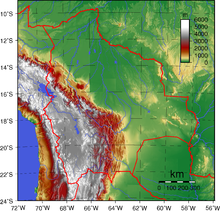| This article needs additional citations for verification. Please help improve this article by adding citations to reliable sources. Unsourced material may be challenged and removed. Find sources: "Cordillera Oriental" Bolivia – news · newspapers · books · scholar · JSTOR (December 2009) (Learn how and when to remove this message) |

The Cordillera Oriental or Eastern Cordillera is a set of parallel mountain ranges of the Bolivian Andes, emplaced on the eastern and north eastern margin of the Andes. Large parts of Cordillera Oriental are forested and humid areas rich in agricultural and livestock products. Geologically, the Cordillera Oriental is formed by the Central Andean fold and thrust belt.
The Bolivian tin belt lies in the cordillera.
Division

The cordillera can be divided into three sections in Bolivia and one in northwestern Argentina:
- The northern section is a continuous mountain range like Eslabón, San Buenaventura, Muchane, Pilón, etc. and between its important summits you can find Astalaya and Cerro Colorado.
- The central section was formed entirely by the Cochabamba mountain range, this section crossing the department of Cochabamba forms the Yungas and the Chapare. Its major summits include Tunari at approximately 5,200 meters and San Benito with 4,298 meters. It extends from the department of Santa Cruz, forming the isolated mountain ranges like Mataracu, San Rafael, Las Juntas, Los Volcanes, these all ending in Amboró National Park.
- The southern section starts north of Chuquisaca with the Presto mountain range and ending in the Caiza and Capirenda mountain ranges in Gran Chaco province in the department of Tarija. The easternmost range of the southern section and the Bolivian Andes is Serranía del Aguaragüe. The southern section does not contain representative summits.
- The Cordillera Oriental extends into Argentina, where it is found from north to south in the provinces of Jujuy, Salta and the northern part of Tucumán Province.
See also
References
- Mlynarczyk, Michael S.J.; Williams-Jones, Anthony E. (2005). "The role of collisional tectonics in the metallogeny of the Central Andean tin belt". Earth and Planetary Science Letters. 240: 656–667. Bibcode:2005E&PSL.240..656M. doi:10.1016/j.epsl.2005.09.047.
- Payrola Bosio et al., 2010, p.310
Bibliography
- Payrola Bosio, Patricio Augusto; del Papa, Cecilia; Hongn, Fernando; Powell, Jaime (2010). "Estratigrafía del Valle de Luracatao (Valle Calchaquí, Noroeste Argentino): Nueva propuesta" (PDF). Revista de la Asociación Geológica Argentina. 67: 309–318. Retrieved 2018-09-07.
17°19′S 66°07′W / 17.317°S 66.117°W / -17.317; -66.117
This Bolivia location article is a stub. You can help Misplaced Pages by expanding it. |
This article about a place in Jujuy Province, Argentina is a stub. You can help Misplaced Pages by expanding it. |
This article about a place in Salta Province, Argentina is a stub. You can help Misplaced Pages by expanding it. |
This article about a place in Tucumán Province, Argentina is a stub. You can help Misplaced Pages by expanding it. |
- Mountain ranges of the Andes
- Mountain ranges of Bolivia
- Mountain ranges of Argentina
- Geography of Chuquisaca Department
- Geography of Cochabamba Department
- Geography of Santa Cruz Department (Bolivia)
- Geography of Jujuy Province
- Geography of Salta Province
- Geography of Tucumán Province
- Bolivia geography stubs
- Jujuy Province geography stubs
- Salta Province geography stubs
- Tucumán Province geography stubs